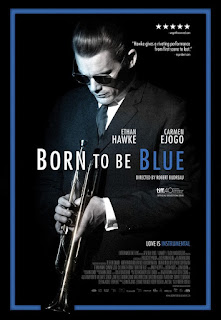The man credited with West Coast Swing was
apparently born to be blue.
Getting an introduction to his parents goes a long way towards
explaining the title and the man, Chet Baker, who was all the rage in the ‘50s
for his trumpet playing. But after
he was introduced to heroin his weakness/need for it, along with a chip on his
shoulder, made him unpredictable and impulsively aggressive toward authority
figures. He was truly addicted to
the drug in his conviction that he could perform better with it, and since
playing was his most valued asset, it assumed top priority.
As with other bio-pics recently, Born to be Blue is not linear in its
structure; the filmmakers intended for it to be “impressionistic” more than
presenting a factual account. And
like this year’s Miles Davis picture, it does not proceed in a linear fashion
so jumps around in time and place.
I’m not a fan of this approach.
On the other hand, Ethan Hawke as Baker
captures what I assume is the essence of the man, his charm, his social
awkwardness, his brittleness of character, and single-minded passion for
music.
Hawke’s
representation evolves subtly and slowly; it takes a while to warm up to the
man. But by the end, he will have
won the viewer’s sympathy and admiration, at least to some extent. The director, Robert Budreau, devotes
ample time to the music, which is beautifully rendered.
Baker desperately wanted to impress Miles Davis
(who was more often derisive) and Dizzy Gillespie, but when he was severely
beaten—purposefully in the mouth, damaging his embouchure—by thugs sent by his
drug dealer, he was forced into hiatus, and most thought he could never play
again. Born/Blue mostly covers
this period of time, showing that for all his flaws, his need to play music
gave him the persistence and commitment to rehabilitate himself.
Born to
be Blue also pays attention to the few people surrounding Baker who were
supportive and probably responsible for saving his career. His wife (Ejogo), an appealing,
attentive woman who eventually could not tolerate his drug use; Dick (Rennie),
his mentor, and finally, Dizzy Gillespie.
A look at the troubled, amazing life of
Chet Baker.
Grade: C+ By Donna R. Copeland

No comments:
Post a Comment